【最新】外研版九年级英语下册状语从句知识点:原因状语从句
外研版英语中考英语状语从句-知识点归纳与练习
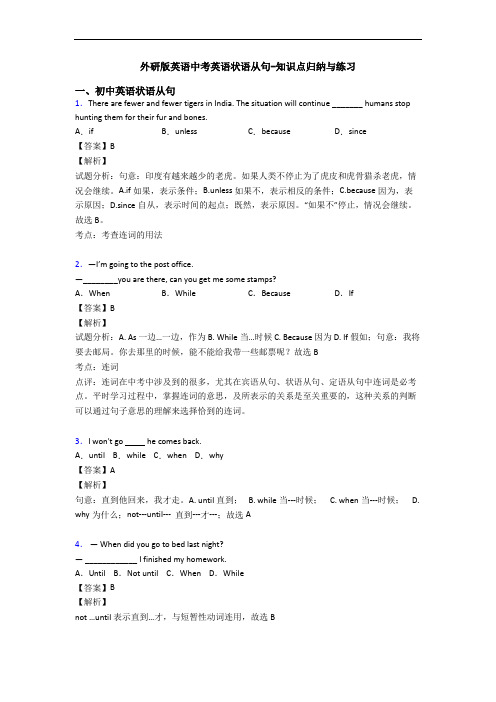
外研版英语中考英语状语从句-知识点归纳与练习一、初中英语状语从句1.There are fewer and fewer tigers in India. The situation will continue _______ humans stop hunting them for their fur and bones.A.if B.unless C.because D.since【答案】B【解析】试题分析:句意:印度有越来越少的老虎。
如果人类不停止为了虎皮和虎骨猎杀老虎,情况会继续。
A.if如果,表示条件;B.unless如果不,表示相反的条件;C.because因为,表示原因;D.since自从,表示时间的起点;既然,表示原因。
“如果不”停止,情况会继续。
故选B。
考点:考查连词的用法2.—I’m going to the post office.—________you are there, can you get me some stamps?A.When B.While C.Because D.If【答案】B【解析】试题分析:A. As 一边…一边,作为 B. While当…时候 C. Because 因为 D. lf假如;句意:我将要去邮局。
你去那里的时候,能不能给我带一些邮票呢?故选B考点:连词点评:连词在中考中涉及到的很多,尤其在宾语从句、状语从句、定语从句中连词是必考点。
平时学习过程中,掌握连词的意思,及所表示的关系是至关重要的,这种关系的判断可以通过句子意思的理解来选择恰到的连词。
3.I won't go he comes back.A.until B.while C.when D.why【答案】A【解析】句意:直到他回来,我才走。
A. until 直到; B. while当---时候; C. when当---时候; D. why为什么;not---until--- 直到---才---;故选A4.— When did you go to bed last night?— ____________ I finished my homework.A.Until B.Not until C.When D.While【答案】B【解析】not …until 表示直到…才,与短暂性动词连用,故选B5.________ there is danger on the internet, online insurance is still popular among the young. A.Unless B.Though C.Since D.Until【答案】B【解析】【详解】句意:虽然网上存在危险,但网上保险在年轻人中仍然很流行。
初中英语知识点归纳原因状语从句的用法

初中英语知识点归纳原因状语从句的用法原因状语从句是英语中的一个重要语法结构,用于表达某个事件或行为的原因。
它由一个主句和一个从句构成,从句中包含一个引导词和一个完整的句子。
在本文中,我们将对初中英语中的原因状语从句的用法进行归纳总结。
1. 引导词:because、as、since这三个词都可以用来引导原因状语从句,表示某个事件或行为的原因。
例如:- I couldn't sleep last night because it was too noisy outside.- As I was tired, I went to bed early.- Since he was busy, he couldn't come to the party.2. 引导词:because of、due to、as a result of这些短语也可以用来引导原因状语从句,表示某个事件或行为的原因,但需要和名词或名词性短语连用。
例如:- We couldn't go to the park because of the heavy rain.- I was absent from school due to illness.- He couldn't attend the meeting as a result of a traffic jam.3. 引导词:since、as、now that这些词可以用来引导原因状语从句,表示某个事件或行为的原因,并且暗示着原因是已知的或对方已经了解。
例如:- Since you are not feeling well, you should stay home and rest.- As it is getting late, we should leave now.- Now that you have finished your homework, you can watch TV.4. 引导词:in order that、so that这些词可以用来引导原因状语从句,表达某个事件或行为的目的。
外研版英语【初中英语】状语从句完整归纳

外研版英语【初中英语】状语从句完整归纳一、初中英语状语从句1.She stopped talking her mother came into the room.A.as soon as B.unless C.though【答案】A【解析】句意:她妈妈一进到房间里,她就停止了说话。
A. as soon as 一----就---; B. unless 除非; C. though尽管;这里是考察连词,根据She stopped talking 和her mother came into the room.之间的关系,可知是妈妈一进到房间里,她就停止了说话;故选A2. Lucy knew nothing about it _____ her sister told her.A.because B.until C.if D.since【答案】B【解析】试题分析:句意:露西直到她姐姐告诉她才知道这件事。
Because因为; until直到; if如果; since自从。
Not···until直到···才,是一个固定句型。
所以选B。
考点:考查连词。
3.I have to leave now __ I can catch the last bus.A.so that B.because of C.until D.as soon as【答案】A【解析】试题分析:so that以便,所以;because of因为,由于;until直到;as soon as一……就……。
句意:为了赶上末班车,我现在必须离开了。
结合语境可知选A。
考点:连词辨析点评:连词在句子中主要起联系上下文的作用,他们之间的区别就是表示逻辑关系的不同,所以在解题时先要理解上下文含义,然后根据上下文逻辑关系选择合适的连词。
连词的用法都比较多,语义之间还有交叉,熟记其基本应用规则,了解其区别,注意固定搭配对象,是做好此类题型的关键。
外研版九年级下英语常用语法知识——状语从句知识点(课后培优)

一、选择题1.—Are the watch _______________ the radio yours?—No. The watch is mine, _______________the radio is my sister's.A.and; but B.and; / C.but; and D./; but A解析:A【解析】【分析】【详解】句意:——那块手表和那个收音机是你的吗?——不是,那块手表是我的,但是那个收音机是我姐姐的。
本题考查连词。
and而且,but但是。
第一空根据谓语are是复数形式,因此主语用复数形式the watch and the radio。
第二空前半句表示那块手表是我的,后半句表示那个收音机是我姐姐的,不是我的,前后表示转折关系,用连词but。
故选A。
2.Mary with her parents ___in Yangzhou. Everyone in her family __Yangzhou is a good place. A.lives; think B.live; thinks C.live; think D.lives; thinks D解析:D【解析】【详解】句意:玛丽和她的父母住在扬州,她家的每一个人都认为扬州是一个好地方。
考查主谓一致。
根据第一句中“Mary with her parents”可知,此处是with连接主语Mary和her parents,遵循“就远一致”原则,所以谓语动词的形式取决于Mary,Mary是第三人称单数形式,所以第一空使用动词第三人称单数形式lives;第二句中everyone是主语,everyone是第三人称单数形式,所以第二空使用动词第三人称单数形式thinks。
故选D。
3.There ______ a great number of visitors to Disneyland in Shanghai in the coming holiday. A.is B.are C.will be D.were C解析:C【解析】【详解】句意:在即将到来的假期里,上海迪斯尼乐园有很多游客。
初中英语:状语从句所有知识点归纳

第十七章状语从句知识点1状语从句的分类知识点2时间状语从句的用法知识点3地点状语从句和条件状语从句的用法知识点4原因状语从句和让步状语从句的用法知识点5比较状语从句和方式状语从句的用法知识点6目的状语从句和结果状语从句的用法知识详单知识点1状语从句的分类知识点2时间状语从句的用法知识点3地点状语从句和条件状语从句的用法知识点4原因状语从句和让步状语从句的用法知识点5比较状语从句和方式状语从句的用法知识点6目的状语从句和结果状语从句的用法考点突破考点1考查时间状语从句的用法1.(龙东中考)-Henry, please call us as soon as you _______ Hawaii.-OK. I'll do that, Mom.A. arrive inB. are arriving inC. will arrive at【解析】选择A as soon as结构意为“一……就……,”引导时间状讲从句,主句为祈使句,从句用一般现在时表示将来。
Hawaii 为大地点.因此用in.考点2考查地点状语从句的用法2.(扬州中考)-My friend has achieved his goal after years of hard work.--- Great.A·One tree can make a forest B. Where there is a will,there is a way C. Many hands make light work D. A friend in need is a friend indeed【解析】选B 第一个人阐述自己的朋友经过多年努力实现目标.,第二个人表示祝贺,同时,发表自己对此事的看法。
应该是“有志者,事竟成”.该句是where引导的地点状语从句。
考点3考查条件状语从句的用法3.(十堰中考)_________ deal with our problems, we can easily become unhappy.A. UntilB. IfC. UnlessD. Though【解析】选C。
英语中状语从句用法及例句总结(完整)
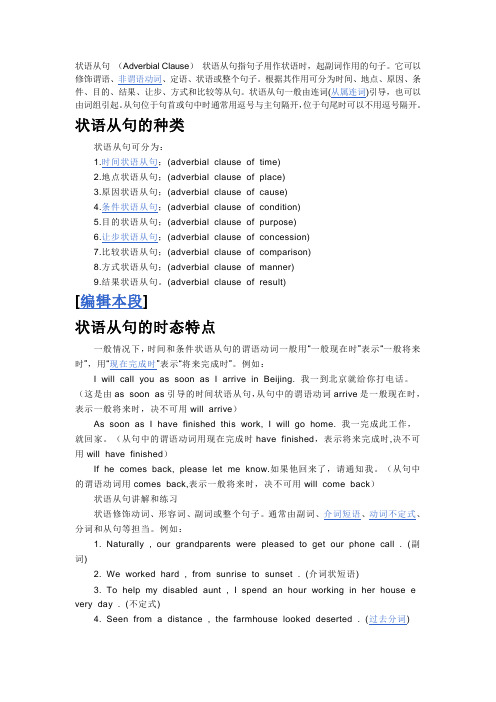
状语从句(Adverbial Clause)状语从句指句子用作状语时,起副词作用的句子。
它可以修饰谓语、非谓语动词、定语、状语或整个句子。
根据其作用可分为时间、地点、原因、条件、目的、结果、让步、方式和比较等从句。
状语从句一般由连词(从属连词)引导,也可以由词组引起。
从句位于句首或句中时通常用逗号与主句隔开,位于句尾时可以不用逗号隔开。
状语从句的种类状语从句可分为:1.时间状语从句;(adverbial clause of time)2.地点状语从句;(adverbial clause of place)3.原因状语从句;(adverbial clause of cause)4.条件状语从句;(adverbial clause of condition)5.目的状语从句;(adverbial clause of purpose)6.让步状语从句;(adverbial clause of concession)7.比较状语从句;(adverbial clause of comparison)8.方式状语从句;(adverbial clause of manner)9.结果状语从句。
(adverbial clause of result)[编辑本段]状语从句的时态特点一般情况下,时间和条件状语从句的谓语动词一般用“一般现在时”表示“一般将来时”,用“现在完成时”表示“将来完成时”。
例如:I will call you as soon as I arrive in Beijing. 我一到北京就给你打电话。
(这是由as soon as引导的时间状语从句,从句中的谓语动词arrive是一般现在时,表示一般将来时,决不可用will arrive)As soon as I have finished this work, I will go home. 我一完成此工作,就回家。
(从句中的谓语动词用现在完成时have finished,表示将来完成时,决不可用will have finished)If he comes back, please let me know.如果他回来了,请通知我。
【初中英语】 状语从句(外研版)(1)

必备英语【初中英语】状语从句(外研版)一、初中英语状语从句1.The teacher speaks very loudly all the students can hear her.A.so that B.because C.since D.when【答案】A【解析】【详解】句意:为了让所有学生都能听见她,老师讲得非常大声。
A. so that 是固定词组,引导目的状语从句时,表示“以便;为了”,从句中常使用can /could /may /might /will /would /should等情态动词或助动词,因此选A。
B. because 意为“因为”;C. since 表示“自……以来,因为,由于”;D. when 意为“当……时”。
老师大声说话的目的是让学生们都听到,所以,B、C、D均不符合题意。
2.— _______ good time we had at the party last night!— Yes. It was _______exciting party that I would never forget it.A.What; so B.How; such C.What a; such an D.How a; so an【答案】C【解析】【详解】试题分析:句意:昨天晚上我们在聚会上玩的是多么开心呀!是的,它是如此的令人兴奋以至于我永远不会忘记它。
第一句为感叹句,是对 a good time表示感叹,time为名词,所以用what来引导,第二句考查such+a/an+adj+n.+that句型结构,表示“如此……的一个东西……以至于”,故选C。
3.--Peter, please send us postcards we’ll know where you have visited.--No problem.A.but B.or C.for D.so【答案】D【解析】句意:——彼得,请给我们及明星片,这样我们将会知道你参观过哪里。
外研版英语【初中英语】状语从句考点+例题_全面解析
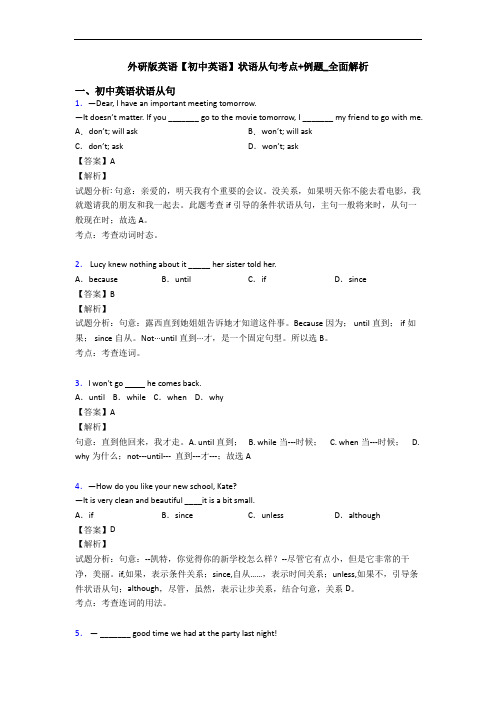
外研版英语【初中英语】状语从句考点+例题_全面解析一、初中英语状语从句1.—Dear, I have an important meeting tomorrow.—It doesn’t matter. If you _______ go to the movie tomorrow, I _______ my friend to go with me. A.don’t; will ask B.won’t; will askC.don’t; ask D.won’t; ask【答案】A【解析】试题分析: 句意:亲爱的,明天我有个重要的会议。
没关系,如果明天你不能去看电影,我就邀请我的朋友和我一起去。
此题考查if引导的条件状语从句,主句一般将来时,从句一般现在时;故选A。
考点:考查动词时态。
2. Lucy knew nothing about it _____ her sister told her.A.because B.until C.if D.since【答案】B【解析】试题分析:句意:露西直到她姐姐告诉她才知道这件事。
Because因为; until直到; if如果; since自从。
Not···until直到···才,是一个固定句型。
所以选B。
考点:考查连词。
3.I won't go he comes back.A.until B.while C.when D.why【答案】A【解析】句意:直到他回来,我才走。
A. until 直到; B. while当---时候; C. when当---时候; D. why为什么;not---until--- 直到---才---;故选A4.—How do you like your new school, Kate?—It is very clean and beautiful ____it is a bit small.A.if B.since C.unless D.although【答案】D【解析】试题分析:句意:--凯特,你觉得你的新学校怎么样?--尽管它有点小,但是它非常的干净,美丽。
2023外研版英语状语从句完整版

6.since(自从……)引导的时间状语从句 We have celebrated the festival since the first pioneers arrived in America.自首批来自英格兰的拓 荒者在17世纪乘船抵达美洲大陆以来,我们就一直庆祝这个节日。 I have known Bill since he was born.从比尔出生起,我就认识他。 二.原因状语从句 1.because引导的原因状语从句 She's my hero because she's one of the best table tennis players in the world.她是我心目中的英雄, 因为她是世界上最优秀的乒乓球运动员之一。 2.since(因为,既然) 引导的时间状语从句 Since everyone is here, let's start.既然大家都到齐了,我们就开始吧。
五.让步状语从句 although/though引导的时间状语从句(不与but 连用) I can look after myself, although it won't be easy for me.我还是可以照顾自己的,虽然这对我来说 并不容易。 He went to fighting, though he was wounded.尽管受了伤,他还是继续战斗。 六.条件状语从句 if引导的条件状语从句(主将从现) If you ever go to London, make sure you visit the Science Museum.如果你去伦敦,一定要去参观 科学博物馆。
3.before/after引导的时间状语从句。 Before we begin dinner, my father gives thanks for the food.吃饭前,我父亲辉表达(因拥有食物 而产生的)感激之情。 After they landed, their first winter was worse than any English winter.到达美洲后,他们所度过的 第一个冬天比英国以往的任何一个冬季都要恶劣。 4.while引导的时间状语从句(进行时态) While they were crossing the Atlantic, many people died.他们中的很多人在横渡大西洋时丧生了。 5.until引导的时间状语从句(not…until…直到……才……) He waited until all the guests left.他一直等到所有客人都走了。 I will not go to bed until I finish my homework.我直到做完作业才上床睡觉。
外研版英语常见状语从句最全总结

外研版英语常见状语从句最全总结一、初中英语状语从句1.___________ she couldn’t see his face, she could tell by his voice that he was young. A.Unless B.If C.Because D.Though【答案】D【解析】【详解】句意:虽然她看不见他的脸,但是她能够通过声音分辨出他很年轻。
A. Unless除非;B. If 如果;C. Because因为;D. Though尽管。
根据语境以及上下文,本题考查的是连词的用法。
结合句意可知,在这里两个句子之间存在一个相反的让步关系,though/although/even though"虽然;尽管",引导让步状语从句,符合句意。
故答案选D。
2.________ there is danger on the internet, online insurance is still popular among the young. A.Unless B.Though C.Since D.Until【答案】B【解析】【详解】句意:虽然网上存在危险,但网上保险在年轻人中仍然很流行。
考查连词辨析。
A. Unless 除非,如果不,引导条件状语从句;B. Though尽管,虽然,引导让步状语从句;C. Since 自….以来,既然,由于,引导时间状语从句和原因状语从句;D. Until:到…为止,在…以前,直到,引导时间状语从句。
根据句意可知前后句句意是转折关系,前句是让步关系,可知填Though;选B。
3.At last, Amy grew ____ tired ____ she fell asleep.A.as; as B.such; that C.so; that D.not only; but also 【答案】C【解析】【详解】句意:最后,艾米累得睡着了。
初中英语状语从句知识点:原因状语从句
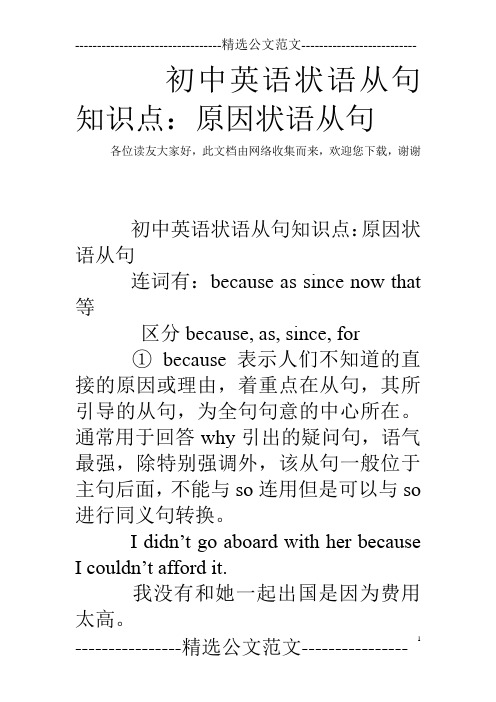
初中英语状语从句知识点:原因状语从句各位读友大家好,此文档由网络收集而来,欢迎您下载,谢谢
初中英语状语从句知识点:原因状语从句
连词有:because as since now that等
区分because, as, since, for
①because表示人们不知道的直接的原因或理由,着重点在从句,其所引导的从句,为全句句意的中心所在。
通常用于回答why引出的疑问句,语气最强,除特别强调外,该从句一般位于主句后面,不能与so连用但是可以与so 进行同义句转换。
I didn’t go aboard with her because I couldn’t afford it.
我没有和她一起出国是因为费用太高。
②as引导的原因状语从句所传递
的通常是已知信息,从句多位于主句之前,表示双方那个已知的理由,如:As I didn’t know the way,I asked a policeman.
我不认识路,因而问警察。
③since引导的原因状语从句多表示大家众所周知的理由,如:
Since traveling by air is much faster, they decided to take a plane.
既然乘飞机旅行快得多,他们就决定坐飞机。
各位读友大家好,此文档由网络收集而来,欢迎您下载,谢谢。
外研版英语【初中英语】状语从句 复习
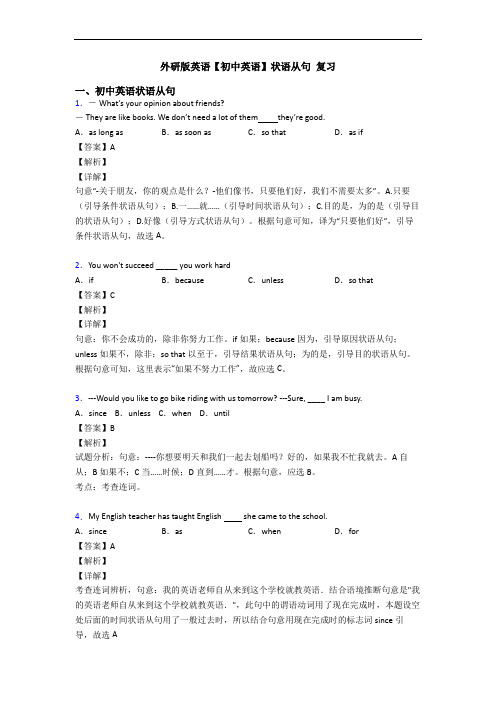
外研版英语【初中英语】状语从句复习一、初中英语状语从句1.-What’s your opinion about friends?-They are like books. We don’t need a lot of them they’re good.A.as long as B.as soon as C.so that D.as if【答案】A【解析】【详解】句意“-关于朋友,你的观点是什么?-他们像书,只要他们好,我们不需要太多”。
A.只要(引导条件状语从句);B.一……就……(引导时间状语从句);C.目的是,为的是(引导目的状语从句);D.好像(引导方式状语从句)。
根据句意可知,译为“只要他们好”,引导条件状语从句,故选A。
2.You won't succeed _____ you work hardA.if B.because C.unless D.so that【答案】C【解析】【详解】句意:你不会成功的,除非你努力工作。
if如果;because 因为,引导原因状语从句;unless如果不,除非;so that以至于,引导结果状语从句;为的是,引导目的状语从句。
根据句意可知,这里表示“如果不努力工作”,故应选C。
3.---Would you like to go bike riding with us tomorrow? ---Sure, ____ I am busy.A.since B.unless C.when D.until【答案】B【解析】试题分析:句意:----你想要明天和我们一起去划船吗?好的,如果我不忙我就去。
A自从;B如果不;C当……时候;D直到……才。
根据句意,应选B。
考点:考查连词。
4.My English teacher has taught English she came to the school.A.since B.as C.when D.for【答案】A【解析】【详解】考查连词辨析,句意:我的英语老师自从来到这个学校就教英语.结合语境推断句意是"我的英语老师自从来到这个学校就教英语.",此句中的谓语动词用了现在完成时,本题设空处后面的时间状语从句用了一般过去时,所以结合句意用现在完成时的标志词since引导,故选A5.—Did you give Dick a call?—I didn’t need to ______ I’ll see him soon.A.when B.through C.until D.because【答案】D【解析】试题分析: 句意:你给汤姆打电话了吗?我没必要打,因为我很快就要看到他了。
【英语】英语语法之:?原因状语从句
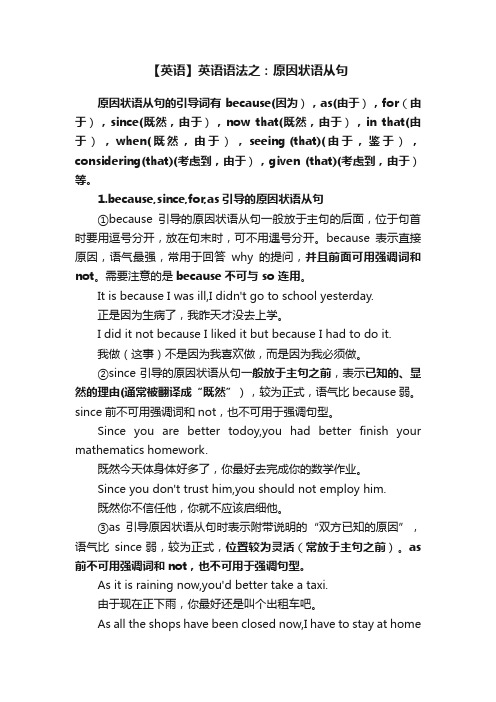
【英语】英语语法之:原因状语从句原因状语从句的引导词有because(因为),as(由于),for(由于),since(既然,由于),now that(既然,由于),in that(由于),when(既然,由于),seeing (that)(由于,鉴于),considering(that)(考虑到,由于),given (that)(考虑到,由于)等。
1.because,since,for,as引导的原因状语从句①because引导的原因状语从句一般放于主句的后面,位于句首时要用逗号分开,放在句末时,可不用遇号分开。
because表示直接原因,语气最强,常用于回答why的提问,并且前面可用强调词和not。
需要注意的是because不可与 so 连用。
It is because I was ill,I didn't go to school yesterday.正是因为生病了,我昨天才没去上学。
I did it not because I liked it but because I had to do it.我做(这事)不是因为我喜欢做,而是因为我必须做。
②since引导的原因状语从句一般放于主句之前,表示已知的、显然的理由(通常被翻译成“既然”),较为正式,语气比because 弱。
since前不可用强调词和not,也不可用于强调句型。
Since you are better todoy,you had better finish your mathematics homework.既然今天体身体好多了,你最好去完成你的数学作业。
Since you don't trust him,you should not employ him.既然你不信任他,你就不应该启细他。
③as引导原因状语从句时表示附带说明的“双方已知的原因”,语气比since 弱,较为正式,位置较为灵活(常放于主句之前)。
外研版初中英语九年级时间状语从句
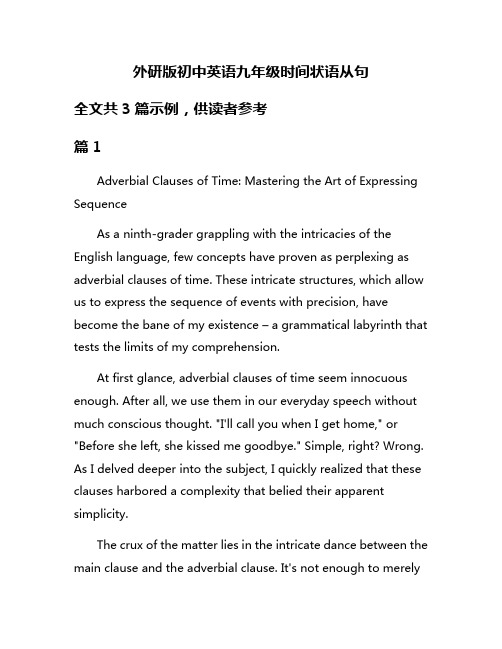
外研版初中英语九年级时间状语从句全文共3篇示例,供读者参考篇1Adverbial Clauses of Time: Mastering the Art of Expressing SequenceAs a ninth-grader grappling with the intricacies of the English language, few concepts have proven as perplexing as adverbial clauses of time. These intricate structures, which allow us to express the sequence of events with precision, have become the bane of my existence – a grammatical labyrinth that tests the limits of my comprehension.At first glance, adverbial clauses of time seem innocuous enough. After all, we use them in our everyday speech without much conscious thought. "I'll call you when I get home," or "Before she left, she kissed me goodbye." Simple, right? Wrong. As I delved deeper into the subject, I quickly realized that these clauses harbored a complexity that belied their apparent simplicity.The crux of the matter lies in the intricate dance between the main clause and the adverbial clause. It's not enough to merelystring them together; no, the true artistry lies in the seamless integration of tenses, ensuring that the sequence of events unfolds with logical clarity. And let's not forget the ever-present specter of punctuation, which can make or break the entire construction.Take, for instance, the dreaded "before" clause. Innocuous as it may seem, this little word carries with it a weight of responsibility that can send even the most seasoned grammarians into a tailspin. "Before I went to bed, I brushed my teeth." Seems straightforward, doesn't it? But what if the sequence were reversed? "I brushed my teeth before I went to bed." Suddenly, the tenses shift, and the very fabric of time becomes unraveled.Then there are the "when" and "while" clauses, which present their own set of challenges. "When I was younger, I loved playing in the rain." Here, the past tense reigns supreme, painting a nostalgic picture of youthful exuberance. But introduce a present or future tense into the mix, and chaos ensues. "When I get older, I will travel the world." Suddenly,we're navigating the treacherous waters of conditional sentences, and the very foundations of grammar seem to crumble beneath our feet.But perhaps the most insidious of all adverbial clauses is the "as soon as" construction. Deceptively simple, it lulls the unsuspecting student into a false sense of security. "As soon as I finish my homework, I'll go out and play." Seems harmless enough, right? Wrong. Introduce a secondary clause, and the entire structure threatens to implode upon itself. "As soon as I finish my homework, which I've been procrastinating on for days, I'll go out and play." Suddenly, we're grappling with the intricacies of embedded clauses, and the very notion of time becomes a fleeting abstraction.And let's not even get started on the "until" and "by the time" clauses, which present their own unique set of challenges. Suffice it to say that mastering these constructions requires a level of mental gymnastics that would put even the most seasoned Olympic athletes to shame.Yet, despite the seemingly insurmountable obstacles, I persevere. For in the depths of this grammatical quagmire lies a profound truth: language is not merely a means of communication; it is a vast tapestry woven from the threads of logic, precision, and human ingenuity. To master adverbial clauses of time is to unlock a door into a world where thoughts can be expressed with crystalline clarity, where the linearprogression of events becomes a canvas upon which we can paint the most vivid of narratives.So, I soldier on, grappling with tenses, punctuation, and the ever-shifting sands of time itself. For in the end, the reward is worth the struggle – the ability to wield language with the deftness of a master craftsman, to shape words into sentences that dance across the page with effortless grace.And who knows? Perhaps one day, when I've conquered the intricacies of adverbial clauses, I'll look back on this journey with fond nostalgia. After all, it is in the crucible of struggle that true mastery is forged.篇2Time Clauses and Their Tricky NatureAs a 9th grader grappling with the intricacies of English grammar, I often find myself stumbling over the very concept of time clauses. These pesky little clauses, with their specific structures and rules, have a way of sending my brain into a tailspin. But alas, they are an inescapable part of mastering the English language, especially in our New Concept English Book 3.At first glance, time clauses may seem innocuous, but their true complexity lies in their ability to manipulate the very fabricof time itself (or so it seems to my teenage mind). They are the masterminds behind conveying when an action occurs, whether it's before, after, or simultaneous with another event. And let's not forget the dreaded concept of "future time reference" – a linguistic minefield that has left many a student, myself included, questioning the very nature of existence.But fear not, dear reader, for I shall endeavor to unravel the mysteries of time clauses, one clause at a time.Let us begin with the most common type of time clause: the "when" clause. Ah, the humble "when" – a word that belies its true power. It is the gatekeeper of simultaneity, indicating that the action in the main clause happens at the same time as the action in the time clause. For example, "I was studying when my friend called." Simple enough, right? Wrong! For you see, the use of the past continuous tense in the main clause implies that the action was already in progress before the time clause event occurred. Mind. Blown.Next, we have the "before" and "after" clauses, the temporal equivalent of a cosmic tug-of-war. These clauses dictate the sequence of events, with "before" clauses indicating that the action in the main clause happens after the time clause event, and "after" clauses indicating the opposite. For instance, "I hadfinished my homework before I went to bed." See? Time is but a mere plaything in the hands of these clauses.But wait, there's more! The "as soon as" and "until" clauses add an extra layer of complexity, representing the specific moments when actions occur. "As soon as" clauses indicate that the main clause action happens immediately after the time clause event, while "until" clauses denote the continuation of an action until a specific point in time. For example, "I'll keep studying until I understand this concept." (Spoiler alert: I may be studying forever.)And then, just when you thought you had a handle on things, the "by the time" clause swoops in, challenging your very notion of temporal linearity. This clause represents an action that has already occurred before another event takes place. For instance, "By the time I realized my mistake, it was too late." Time, it seems, is but a cruel, cruel mistress.But fear not, dear reader, for I have not yet exhausted the depths of time clause tomfoolery. Lest we forget the "whenever" and "every time" clauses, which introduce the concept of repetition into our already befuddled minds. These clauses indicate that the main clause action occurs each time the time clause event happens. For example, "Whenever I study for toolong, my brain starts to hurt." (A tragically common occurrence, I must admit.)And just when you thought you had mastered the art of time clauses, the "since" and "for" clauses appear, like linguistic ninjas, to remind you of the passage of time itself. "Since" clauses convey the idea of an action that started in the past and is still ongoing, while "for" clauses indicate the duration of an action. For instance, "I have been studying English for three years since I started secondary school." Time, it seems, is a relentless taskmaster.But alas, my dear reader, we have reached the end of our journey through the labyrinth of time clauses. As I look back on the trials and tribulations of mastering these grammatical constructs, I am reminded of the wise words of a philosopher (or was it a comedian?): "Time is an illusion, lunchtime doubly so."In all seriousness, though, time clauses are an essential part of the English language, and their mastery is a crucial step in becoming a proficient communicator. While they may seem daunting at first, with practice and perseverance, they can be tamed, like wild linguistic beasts.So, my fellow students, let us embrace the challenges posed by time clauses, for they are but a stepping stone on our path tolinguistic enlightenment. And who knows? Perhaps one day, we shall look back on these struggles and laugh, secure in the knowledge that we have conquered the very fabric of time itself (or at least its grammatical representation).篇3Mastering Adverbial Clauses of Time: A Student's JourneyAs a 9th grader, the world of English grammar can sometimes feel like a daunting labyrinth, with its countless rules and exceptions. However, one aspect that has captured my interest and challenged me in equal measure is the realm of Adverbial Clauses of Time. These intricate structures not only add depth and nuance to our expressions but also serve as a gateway to more advanced linguistic prowess.When I first encountered Adverbial Clauses of Time, I must admit, I was utterly perplexed. The idea of subordinating one clause to another seemed like an insurmountable obstacle. However, with patience and perseverance, I gradually unraveled the mysteries behind these constructions, and my appreciation for their significance grew exponentially.Adverbial Clauses of Time, as the name suggests, are clauses that provide information about the time at which the action inthe main clause occurs. They are introduced by subordinating conjunctions such as "when," "while," "as," "until," "since," "after," "before," and "as soon as." These conjunctions act as signposts, guiding us through the temporal landscape of the sentence.One of the first Adverbial Clauses of Time that I mastered was the "when" clause. It was a revelation to discover how a simple word like "when" could transform a mundane statement into a rich tapestry of temporal context. For example, "I will call you when I arrive home" conveys not only the action of calling but also the specific time frame in which it will occur – upon arrival at home.As I delved deeper into this realm, I encountered the "while" clause, which introduced me to the concept of simultaneous actions. Sentences like "While I was studying, my friend called me" painted a vivid picture of two events unfolding concurrently, allowing me to appreciate the intricate choreography of language.The "since" clause was another fascinating discovery, enabling me to express actions that began in the past and continue into the present or future. "Since I started learning English, my vocabulary has improved significantly" is a primeexample of how this clause highlights the duration and ongoing nature of an event.However, my journey was not without its challenges. The "until" and "before" clauses initially caused me some confusion, as they required a careful consideration of the sequence of events. It took practice and guidance from my teachers to fully grasp the nuances of statements like "I won't leave until you arrive" and "Finish your homework before you go out to play."One aspect that particularly intrigued me was the versatility of Adverbial Clauses of Time. They could be placed at the beginning, middle, or end of a sentence, allowing for varying degrees of emphasis and narrative flow. For instance, "After I had finished my chores, I went to the park" places the temporal clause at the beginning, setting the stage for the subsequent action. Conversely, "I went to the park after I had finished my chores" positions the clause at the end, providing a sense of closure and completion.As I progressed through my studies, I also encountered more advanced variations of Adverbial Clauses of Time, such as the "as soon as" clause and the "no sooner...than" construction. These intricate structures added layers of nuance and precisionto my expressions, enabling me to convey complex temporal relationships with greater clarity.One of the most rewarding aspects of mastering Adverbial Clauses of Time has been the ability to craft more sophisticated and engaging narratives. By skillfully weaving these clauses into my writing, I can transport readers through intricate timelines, creating a rich tapestry of events that unfold in a logical and captivating manner.Moreover, understanding Adverbial Clauses of Time has also enhanced my comprehension of spoken English. I can now readily follow conversations that involve intricate temporal references, appreciating the subtle nuances and implications conveyed by the speaker.As I approach the end of my 9th grade journey, I can confidently say that my exploration of Adverbial Clauses of Time has been a transformative experience. It has challenged me intellectually, honed my analytical skills, and expanded my linguistic horizons. While the path was not always straightforward, the sense of accomplishment and the newfound mastery over these constructions have instilled in me a profound appreciation for the intricacies of language.Looking ahead, I am excited to continue building upon this foundation, exploring even more complex grammatical structures and unlocking the full potential of the English language. The journey may be long, but with dedication and a love for learning, I am confident that I will navigate its twists and turns, emerging as a more proficient and articulate communicator.In conclusion, my foray into Adverbial Clauses of Time has been a microcosm of the broader adventure that is language acquisition. It has taught me valuable lessons in perseverance, critical thinking, and the rewards of embracing challenges. As I embark on the next chapter of my linguistic odyssey, I carry with me the invaluable insights gained from this experience, ready to conquer new frontiers and unlock the boundless potential of communication.。
状语从句知识点详解(初中英语专项复习)7
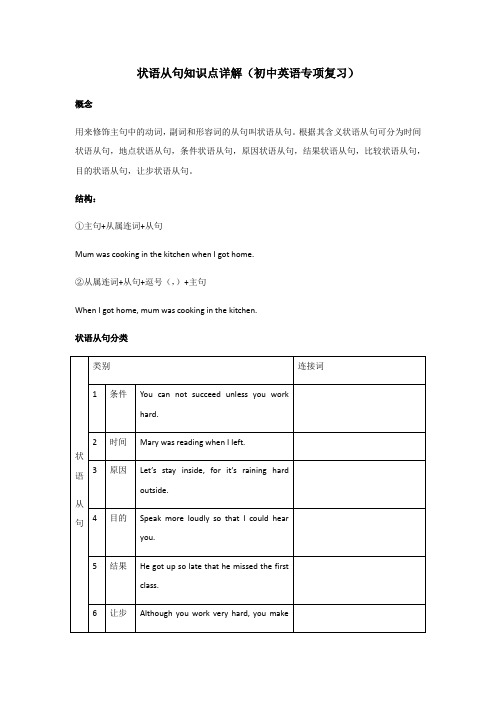
状语从句知识点详解(初中英语专项复习)概念用来修饰主句中的动词,副词和形容词的从句叫状语从句。
根据其含义状语从句可分为时间状语从句,地点状语从句,条件状语从句,原因状语从句,结果状语从句,比较状语从句,目的状语从句,让步状语从句。
结构:①主句+从属连词+从句Mum was cooking in the kitchen when I got home.②从属连词+从句+逗号(,)+主句When I got home, mum was cooking in the kitchen.状语从句分类时间状语从句条件状语从句常见句型转换题:If...not = unless,在句型转换题中,if (如果)常常和unless(除非)and(那么)或or(否则)互换。
If you don’t get up early, you will fail to catch the bus.(保持句意不变)= You won’t catch the bus unless you get up early.=You should get up early, or you will miss the bus.=Get up early, and you may/ will catch the bus.原因状语从句because 和so 不能用于同一句子中,because表示原因未知,语气最强回答why的提问。
because引导的从句可与because of引导的简单句互换。
as 语气最弱,常常用于口语中,since和nowthat(既然)表示已知的原因,一般放在主句之前。
She didn’t go to see the movie because the weather was bad.=She didn’t go to see the movie because of the bad weather.The sports meeting was put off because the weather was bad.=The sports meeting was put off because of the bad weather.目的状语从句so that +从句=in order that+从句常与in order to 和so as to +短语互换,目的状语从句常常会和情态动词can, may, will, could, might, would等连用He walked quickly so that he could get there on time.=He walked quickly in order that he could get there on time.=He walked quickly in order to get there on time.=He walked quickly so as to get there on time.结果状语从句So...that(如此.......以至于)在句型转换中常常会和enough to do 或者too...to互换,结果状语状语从句常常会和情态动词can, may, will, could, might, would等连用。
外研版英语【初中英语】状语从句知识点总结含答案解析

外研版英语【初中英语】状语从句知识点总结含答案解析一、初中英语状语从句1.--Peter, please send us postcards we’ll know where you have visited.--No problem.A.but B.or C.for D.so【答案】D【解析】句意:——彼得,请给我们及明星片,这样我们将会知道你参观过哪里。
——没问题。
but 但是,表示转折关系;or或者,表示选择;for为了,表示原因;so所以,表示结果。
结合句意,前半句让彼得给我们及明信片,后半句知道彼得到哪里参观了,后一句是前一句的结果,故用连词so。
故选D。
2.Tony has had to cook by himself ________ his mother went on business to Guangzhou. A.since B.after C.during D.when【答案】A【解析】【详解】句意:自从妈妈去广州出差以来,托尼不得不自己做饭。
A. since从……以来;B. after在……之后;C. during 在……期间;D. when当……时候。
since后跟时间状语从句时,表示的是到目前为止的时间段,从句时态为一般过去时,而主句的时态为现在完成时,故正确答案为A。
3._______ you do in the future, you should try your best to do it well.A.However B.Whenever C.Whoever D.Whatever【答案】D【解析】试题分析:句意:无论你将来做什么,你都应该尽你的最大努力把它做好。
however 然而,无论怎样;whenever 无论什么时候;whoever 无论是谁;whatever 无论什么。
根据句意可知,这里表示无论你做什么,所以应该用whatever。
考点:考查连词。
外研版英语【初中英语】状语从句综合分类解析

外研版英语【初中英语】状语从句综合分类解析一、初中英语状语从句1.—Ling ling, you'll feel sleepy tomorrow _______ you go to bed early.—OK, Mom. I’ll go to bed at once.A.if B.unless C.though D.because【答案】B【解析】【详解】句意:——玲玲,如果你不早点睡觉,明天你会感到困的。
——好的,妈妈。
我马上去睡觉。
考查连词辨析。
A. if如果,引导条件状语从句;B. unless如果不、除非,相当于if not,引导条件状语从句;C. though虽然、尽管,引导让步状语从句;D. because因为,引导原因状语从句。
通过分析主从句之间的逻辑关系可知应该选择引导条件状语从句的从属连词if 或unless,再根据句子所表达的含义“如果不早点睡,明天就会感到困”可知unless符合语意,排除if;故答案选B。
2.At last, Amy grew ____ tired ____ she fell asleep.A.as; as B.such; that C.so; that D.not only; but also 【答案】C【解析】【详解】句意:最后,艾米累得睡着了。
A. as; as 与…一样;引导比较状语从句;B. such; that如此...以致;如此...以至于,引导结果状语从句;C. so; that如此…以致…;引导结果状语从句;D. not only; but also不但…而且…连接两个并列主语。
根据句意可知,此句是结果状语从句,such是形容词,修饰名词;so是副词,与形容词或副词连用。
本题第一空所填词要修饰形容词tired,所以应填so,故选C。
3.I still remember my first teacher________we haven't seen each other for many years. A.for B.because C.since D.though【答案】D【解析】试题分析:句意:尽管我们很多年没有见过面了,但是我仍然记得我的第一位老师。
外研版英语中考英语状语从句完整归纳

外研版英语中考英语状语从句完整归纳一、初中英语状语从句1.Helen was very rude to me. I refuse to speak to her again __________ she says sorry. A.until B.if C.because D.since【答案】A【解析】【详解】句意:海伦对我粗鲁,我拒绝跟她再次说话,直到她向我道歉为止。
考查连词辨析。
until 直到……才;if 如果;because 因为;since 自从,既然。
结合句意可知,此句是until引导的时间状语从句,故答案选A。
2.My English teacher has taught English she came to the school.A.since B.as C.when D.for【答案】A【解析】【详解】考查连词辨析,句意:我的英语老师自从来到这个学校就教英语.结合语境推断句意是"我的英语老师自从来到这个学校就教英语.",此句中的谓语动词用了现在完成时,本题设空处后面的时间状语从句用了一般过去时,所以结合句意用现在完成时的标志词since引导,故选A3.We will go to Tian’anmen Square to watch the raising of national flag if it _________ tomorrow.A.will rain B.rainsC.doesn’t rain D.won’t rain【答案】C【解析】试题分析:句意:如果明天不下雨我们要去天安门广场看升国旗。
根据句意及题干分析if 引导的是条件状语从句,主句是一般将来时态,根据“主将从现”原则,if从句中应用一般现在时态,根据句意是“不下雨”,所以选C。
【考点定位】考查动词的时态。
4.--- What was the party like?--- Wonderful. It’s years ____ I enjoyed myself so much.A.since B.after C.when D.before【答案】A【解析】试题分析:句意:聚会怎么样?太精彩了,好多年了我没玩的这么高兴过。
外研版九年级英语状语从句(完整版)
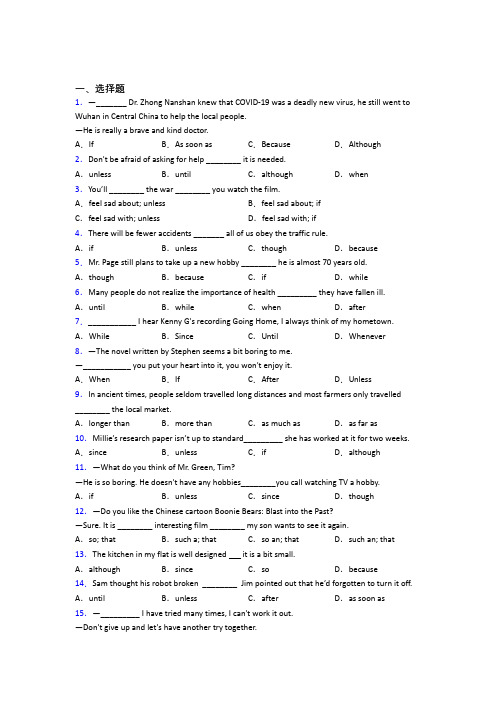
一、选择题1.—_______ Dr. Zhong Nanshan knew that COVID-19 was a deadly new virus, he still went to Wuhan in Central China to help the local people.—He is really a brave and kind doctor.A.If B.As soon as C.Because D.Although 2.Don't be afraid of asking for help ________ it is needed.A.unless B.until C.although D.when 3.You’ll ________ the war ________ you watch the film.A.feel sad about; unless B.feel sad about; ifC.feel sad with; unless D.feel sad with; if4.There will be fewer accidents _______ all of us obey the traffic rule.A.if B.unless C.though D.because 5.Mr. Page still plans to take up a new hobby ________ he is almost 70 years old. A.though B.because C.if D.while6.Many people do not realize the importance of health _________ they have fallen ill. A.until B.while C.when D.after7.___________ I hear Kenny G's recording Going Home, I always think of my hometown. A.While B.Since C.Until D.Whenever 8.—The novel written by Stephen seems a bit boring to me.—___________ you put your heart into it, you won't enjoy it.A.When B.If C.After D.Unless9.In ancient times, people seldom travelled long distances and most farmers only travelled ________ the local market.A.longer than B.more than C.as much as D.as far as 10.Millie’s research paper isn’t up to stan dard_________ she has worked at it for two weeks. A.since B.unless C.if D.although 11.—What do you think of Mr. Green, Tim?—He is so boring. He doesn't have any hobbies________you call watching TV a hobby.A.if B.unless C.since D.though 12.—Do you like the Chinese cartoon Boonie Bears: Blast into the Past?—Sure. It is ________ interesting film ________ my son wants to see it again.A.so; that B.such a; that C.so an; that D.such an; that 13.The kitchen in my flat is well designed it is a bit small.A.although B.since C.so D.because 14.Sam thought his robot broken ________ Jim pointed out that he’d forgotten to turn it off. A.until B.unless C.after D.as soon as 15.—_________ I have tried many times, I can't work it out.—Don't give up and let's have another try together.A.Since B.Because C.Unless D.Though 16.—Mike, can you tell me how to speak in an online class?—Sure, click on this icon you start to speak.A.after B.until C.before D.since 17.Benny, monitor of our class, is such ________ honest boy that we all trust him.A.a B.an C.the D./18.— I never knew you could make such delicious handmade noodles.—I learned it from an app ________ I stayed at home during the lockdown (封锁).A.since B.before C.when D.until19.—It's time for me to go back home now.—Really? ________ you have to go, take the umbrella, it's raining outside.A.If B.When C.Until D.Unless 20.—More and more people like shopping online now.—I agree. My sister will be crazy about it ________ my parents give her enough money.A.if B.unless C.when D.while21.— What do you think of Spud Webb, the shortest player in the NBA?一 Amazing, ________he was refused many times at first.A.unless B.though C.since D.because 22.—The local snack tastes spicy and sweet.—Well, ___________ you are here, why not have a try?A.since B.because C.though D.unless23.Dr. Smith will never leave his parents ________ he is sure both of them are taken good care of.A.since B.though C.if D.unless24.You will get a toothache _____________ you clean your teeth regularly.A.unless B.when C.though D.because25.My parents gave red packets to my cousin every Spring Festival___________ she got a job, because she said she was able to make money.A.after B.when C.until D.since26.You will never grow ________ you try to do something beyond your abilities.A.when B.since C.though D.unless27.He realized his mistakes and took action to reduce the loss ________ it was too late. A.before B.unless C.if D.until28.________ she couldn’t see his face, she could tell by his voice that he was young. A.Unless B.If C.Though D.Because29.—I hear you are going to visit Disneyland next month. May I go there with you?—I’m afraid not, ________ you have a ticket.A.if B.unless C.until D.as soon as 30.You should say it louder ________ everyone can hear you.A.in order B.to C.so that D.in order to31.—We will go out for a picnic as we planned ________ it rains tomorrow.—You needn’t worry about the weather. It’s sunny tomorrow.A.until B.unless C.if D.when32.— Will little John arrive on time?—I’m afraid not, ________ the sun rises in the west.A.if B.although C.until D.unless 33.Andrew thought there was something wrong with his robot ________ Samuel pointed out that he probably forgot to change the battery.A.until B.if C.after D.since34.— Why did your mother get ________ with you just now?—Because I made ________ many mistakes in the exam that she ________ controlled her feelings when she heard it.A.satisfied; so; really B.satisfied; such; nearlyC.angry; so; hardly D.angry; such; mainly35.—Did you watch the Football League yesterday?—Yes, of course. I never miss it ________ I am too busy with my homework.A.unless B.until C.if D.since36.Life is like climbing a mountain. ________ you feel tired, you will enjoy the beautiful view at the top of the mountain.A.Since B.Unless C.Because D.Though37.— Jenny, will you leave for the UK now?— No. It will be two weeks ________ I leave here.A.until B.since C.before D.when38.Her job is not up to the boss's standard ________ she has worked at it for a week. A.since B.although C.if D.unless 39.—You look so sad. What happened?—The home for the elderly will be closed ________ it can get more donations.A.since B.unless C.if D.because40._______ the outbreak of COVID-19 is a terrible blow to the country, the government is trying hard to bring the situation under control.A.Although B.If C.Unless D.However41.In summer, milk quickly goes bad ________ it is put into a fridge.A.though B.unless C.because D.once42.— Labour education is an important course for students’ self-development.— Exactly. schools put it into practice, students will learn a lot.A.While B.Unless C.If D.As43.The theatre will have to close ________ the government agrees to give extra money.A.if B.unless C.because D.until44.The astronaut lives in ________ that he has to be careful with every movement.A.such little space B.so little space C.so much space D.such more space 45.At present,it is not easy for some students to get up early ________ they have too much homework to finish.A.unless B.since C.as a result D.although46.________ she is wrong, it’s not a big deal.A.Because B.So C.Although D.But47.You will be out of date ________ you keep on studying from time to time.A.unless B.although C.if D.otherwise 48.— A sandstorm hit the north a few weeks ago. It was the strongest in ten years.—The environment won’t get better ________ we take action to protect it.A.if B.since C.though D.unless49.My grandma enjoys sharing videos on Douyin like the young ________ she is over seventy. A.since B.if C.though D.unless 50.Suzy, you will achieve nothing ________ you devote yourself to your study.A.after B.though C.because D.unless【参考答案】***试卷处理标记,请不要删除一、选择题1.D【详解】句意:——虽然钟南山医生知道新冠肺炎是一种致命的新病毒,但他仍然前往华中地区的武汉帮助当地人民。
- 1、下载文档前请自行甄别文档内容的完整性,平台不提供额外的编辑、内容补充、找答案等附加服务。
- 2、"仅部分预览"的文档,不可在线预览部分如存在完整性等问题,可反馈申请退款(可完整预览的文档不适用该条件!)。
- 3、如文档侵犯您的权益,请联系客服反馈,我们会尽快为您处理(人工客服工作时间:9:00-18:30)。
初中英语状语从句知识点:原因状语从句
连词有:because as since now that等
(1)区分because, as, since, for
①because表示人们不知道的直接的原因或理由,着重点在从句,其所引导的从句,为全句句意的中心所在。
通常用于回答why引出的疑问句,语气最强,除特别强调外,该从句一般位于主句后面,不能与so连用但是可以与so进行同义句转换。
I didn't go aboard with her because I couldn't afford it.
我没有和她一起出国是因为费用太高。
②as引导的原因状语从句所传递的通常是已知信息,从句多位于主句之前,表示双方那个已知的理由,如:
As I didn't know the way,I asked a policeman.
我不认识路,因而问警察。
③since引导的原因状语从句多表示大家众所周知的理由,如:
Since traveling by air is much faster, they decided to take a plane.
既然乘飞机旅行快得多,他们就决定坐飞机。
④for表示的理由是附加的或推断的,并非此原因,通常与主句用逗号隔开,不位于句首,如:
He must be not at home, for the telephone isn't answered.
用because, as, since, for 填空:
We'll have to go to bed early ___________ we'll start off early tomorrow.
___________ you know all about it, tell me please.
____________ all the seats were taken, I had to stand.
He must be at work, __________ the light in his office is still on.
Lily didn't go to school ___________ she was ill.
=_________________________________________________________.
(4) now that引导的原因状语从句
Now that "因为;既然",通常可以和since换用。
用来表示一种新的情况,再加以推论。
如:
Now(that) you have passed your test, you can drive on your own.
你既已考试合格,就可以独自开车了。
